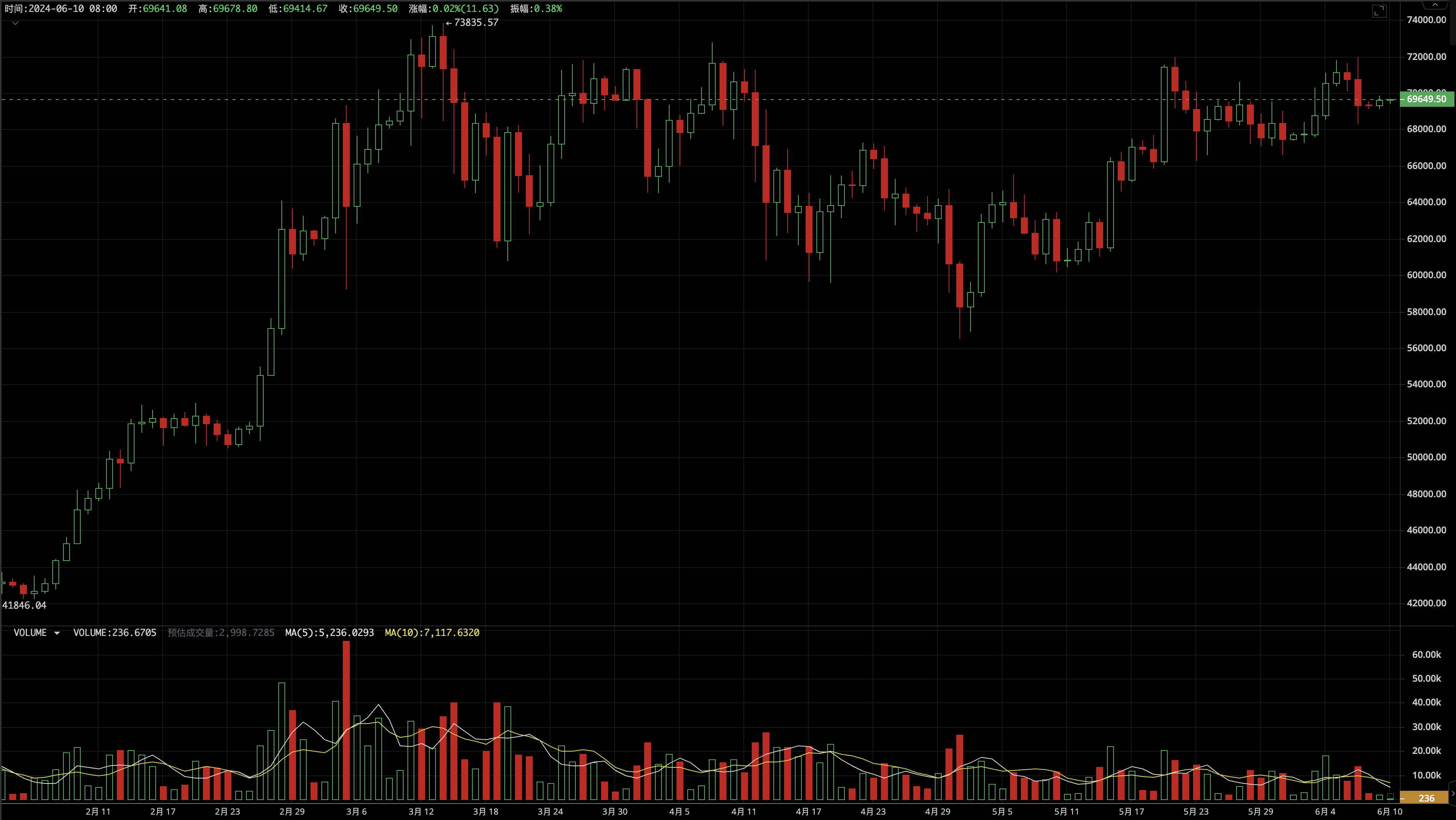Written by: Shang2046
The information, opinions and judgments on markets, projects, currencies, etc. mentioned in this report are for reference only and do not constitute any investment advice.

Before November 6 , the United States faced the disclosure of key data, the second interest rate cut meeting of the year, and the US election. Amid a series of uncertainties, BTC once again reached a breakthrough point of a historical high.
Market Summary
This week, BTC opened at 69014.87 and closed at 67943.19 USD, down 1.55% for the whole week, with an amplitude of 6.30% and a shrinking volume. This week's BTC market can be understood as a technical confirmation of the decline of US stocks after a sharp rebound. What will happen to both US stocks and BTC in the next 10 days may be crucial in American history.
In the next 10 days, the United States will successively announce the scale of quarterly U.S. Treasury bond sales, non-farm employment data, third-quarter GDP, and the PCE price index. On November 5 and 6, the results of the U.S. election will be announced and the penultimate interest rate meeting of the year will be held.
Over the past month, with strong US economic data and neutral employment data, U.S. Treasury prices continued to fall, indicating a further reduction in market expectations for a rate cut.
If Trump comes to power, mainstream institutions predict that the combination of loose fiscal policy and tight monetary policy will be more inclined, which will bring about an overall macroeconomic environment of strong dollar, strong economy, high inflation and high interest rates, as well as greater "unpredictability" due to Trump's own style.
For BTC, the slowdown in interest rate cuts and the strong dollar are negative factors; high inflation is a favorable factor for its safe-haven properties; Trump and the Republican Party's friendliness to the crypto world is a long-term positive. This is how the world is, not simply linear. The contradictory external factors, as a whole, constitute short-term neutral and long-term positive external factors.
In this case, the internal structure of BTC becomes more important. The good news is that the structure of BTC chain is still relatively stable, ready for the continued rebound of the market. The market outlook still focuses on the trend of US stocks. As the end of the election approaches, the trend of US stocks may fluctuate to a certain extent, focusing on the earnings of the 7 giants and the risk preference of funds leaving the market after the election is settled.
Federal Reserve and economic data
Continuing the previous argument, the Fed officials' speeches revolved around "supporting cautious, gradual and slow rate cuts". The Fed seems to want to create such an argument: rate cuts will continue, but they are different from the expectations formed by the first rate cut, and the market will bear a higher CPI next year, and the rise in neutral interest rates is inevitable. CME Fed observes that the probability of a 25-point rate cut in November is 96.3%.
The U.S. dollar index rose another 0.88% to 104.33, marking its fifth consecutive week of gains, keeping all markets under pressure.
The sell-off of US bonds continued, prices fell, and yields rose, with the 2-year and 10-year yields rising to 4.107% and 4.232%. London gold rose another 0.89% to close at $2,745.
The Dow Jones and S&P 500 ended their two-week winning streak, falling 2.68% and 0.96% respectively. The Nasdaq continued its winning streak, achieving a seven-week winning streak, hitting a record high during the session, but the increase was only 0.16%. Tesla released its earnings report that exceeded expectations this week, and the stock surged 22% the next day. Next week, Apple, Microsoft, Google, etc. will release their earnings reports, which may be the key factor in whether the Nasdaq will continue to rise.
Funding and supply analysis
Continuing last week's inflow, funds continued to flow in this week at 827 million, but less than last week's 2.52 billion.
BTC ETF is still the protagonist, with a net inflow of $1 billion, while the stablecoin channel has an outflow of 169 million. So far, the US spot ETF has accumulated a net inflow of $21.5 billion, with a total holding of 983,600 coins. At the current inflow rate, it will exceed the 1 million mark around the US election. It should be pointed out that according to EMC Labs' monitoring, the average purchase cost of ETFs is $59,500.
Among stablecoins, USDT and USDC have diverged in inflows, with USDT inflows of 135 million and USDC continuing to have a large outflow of 300 million. USDC has had a large outflow for three consecutive weeks, but the outflow scale is decreasing. It is not clear whether the outflow of compliant USD stablecoins is related to the recent strength of the US dollar and the reduction in expectations of interest rate cuts.
On the supply side, the second reduction of long-term investors' holdings that started in the past two months has been temporarily stopped, and there has been a slight increase in holdings. Correspondingly, short-term investors have also slightly reduced their holdings. But it is not enough to form a trend. The cost line of short-term investors is $63,500, and the profit is about 5%.
Ecological analysis
BTC new addresses, active addresses, and value transfer scale remain low. Transactions fell slightly.
The number of new addresses and active addresses in the Ethereum ecosystem fell slightly, and Transactions hit a new high (from Base).
Solana continues to maintain its vitality, with new addresses, active addresses, and transactions all reaching record highs.
Cycle Indicators
The EMC BTC Cycle on-chain data engine shows that we are still in the relay period of the bull market acceleration period, awaiting further breakthroughs in the market, and the indicator strength is 0.5.













